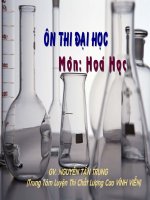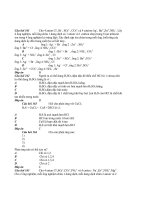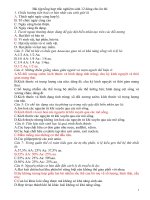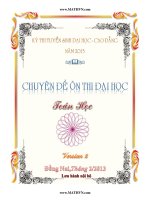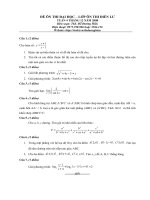on thi dai hoc 7
Bạn đang xem bản rút gọn của tài liệu. Xem và tải ngay bản đầy đủ của tài liệu tại đây (143.63 KB, 6 trang )
<span class='text_page_counter'>(1)</span>SỞ GIÁO DỤC VÀ ĐÀO TẠO AN GIANG TRƯỜNG THPT BA CHÚC ĐỀ CHÍNH THỨC (Đề thi có 06 trang). ĐỀ THI THỬ ĐẠI HỌC LẦN I NĂM 2013 Môn: TIẾNG ANH; Khối D, A1 Thời gian làm bài: 90 phút, không kể thời gian phát đề. Họ, tên thí sinh:……………………………………………….. Số báo danh:………………………………………………….... Mã đề thi: 234. ĐỀ THI GỒM 80 CÂU (TỪ QUESTION 1 ĐẾN QUESTION 80) Mark the letter A, B, C, or D on your answer sheet to indicate the word that differs from the rest in the position of the main stress in each of the following questions. Question 1: A. chemical B. procedure C. commentate D. alcohol Question 2: A. calculation B. conventional C. apprehension D. preferential Question 3: A. satisfactory B. military C. generator D. generously Question 4: A. committee B. referee C. refugee D. employee Question 5: A. employment B. company C. customer D. atmosphere Mark the letter A, B, C, or D on your answer sheet to show the underlined part that needs correction in each of the following questions. Question 6: In very early times, people around the fire were entertained by storytellers with stories of A B C heroes’ victory and wonderful actions . D Question 7: We have heard so many news about recent developments in computer technology. A B C D Question 8: The painting Sun Flower, which painted by Van Gogh, was stolen many times. A B C D Question 9: Of the two cars that the Smiths have, the Plymouth is, without any questions, the cheapest to run. A B C D Question 10: Educated in the UK, his qualifications are widely recognized in the world of professionals. A B C D Read the following passage and mark the letter A, B, C or D on your answer sheet to indicate the correct word for each of the blanks from 11 to 20. The traditional definition of literacy is considered to be the ability to read and write, or the ability to use language to read, write, listen, and speak. In modern contexts, the word refers to reading and writing at a level (11) _____ for communication, or at a level that lets one understand and communicate ideas in a literate society,' so as to take (12)_____ in that society. The United Nations, Educational, Scientific and Cultural Organization (UNESCO) has drafted the following definition: “Literacy is the ability to identify, understand, interpret, create, communicate and compute, using printed and written' materials (13) _____ with varying contexts. Literacy involves a continuum of learning to enable an Individual to achieve his or her goals, to develop his, or her (14) _____ and potential, and to participate fully in the wider society." Many policy analysts consider literacy rates a crucial measure of a region's human capital. This claim is made on the (15) _____ that literate people can be trained less expensively than illiterate people, generally have a higher socio-economic (16) _____ and enjoy better health and employment prospects. Policy makers also argue that literacy increases job opportunities and access to higher education. In Kerala, India, for example, female and child mortality rates declined (17) _____ in the 1960s, when girls who were educated in the education reforms after 1948 began to raise families. Recent researchers, (18)_____, argue that correlations such as, the one listed above may have more to do with the effects of schooling rather than literacy in general. Regardless, the (19) _____ of educational systems worldwide includes a basic (20) _____ around communication through test and print, which is the foundation of most definitions of literacy. Question 11: A. adaptable B. suitable C. adequate D. important Question 12: A. comfort B. control C. part D. honor.
<span class='text_page_counter'>(2)</span> Question 13: A. associated B. worked Question 14: A. ability B. knowledge Question 15: A. foundations B. ways Question 16: A. condition B. request Question 17: A. dramatically (đột ngột)B. extremely Question 18: A. additionally B. however Question 19: A. focus B. demand Question 20: A. content B. concept. C. appropriated C. performance C. grounds C. state C. actually C. therefore C. majority C. contact. D. related D. behavior D. basics D. status D. accurately D. consequently D. main D. context. Mark the letter A, B, C, or D on your answer sheet to indicate the sentence that is closest in meaning to each of the following questions: Question 16: If it hadn’t been for his carelessness, we would have finished the work. A. He was careless because he hadn’t finished the work. B. If her were careful, we would finish the work. C. If he had been more careful, we would have completed the work. D. Because he wasn’t careless, we didn’t finish the work. Question 17: The hostess made every effort to see that her guests got the food and drinks they wanted. A. The hostess was reluctant to offer her guests food and drinks. B. The hostess tried hard to please her guests. C. The guests refused the food and drinks prepared by the hostess. D. Neither the guests nor the hostess had food or drinks. Question 18: Twice as many men as women are insurance agents. A. More men than women have insurance. B. Male insurance agents outnumber female agents. C. Women are twice as likely as men to have sold insurance. D. Insurance is twice as difficult to sell to women as to men. Question 19: Most people get fewer colds in the summer than in the winter. A. A person is more likely to get a cold in the winter than in the summer. B. More people have summer colds than winter colds. C. People get colder in the summer than in the winter. D. The winter is much colder than the summer. Question 20: She decided not to go to the university, and worked as a cook instead. A. Instead of working as a cook, she decided to go to the university. B. In place of going to the university, she worked as a cook. C. She preferred working as a cook to going to the university. D. She worked as a cook because she liked it very much. Read the following passage and mark the letter A, B, C, or D on your answer sheet to indicate the correct answer to each of the questions 26 to 35. COLORS AND EMOTIONS Colors are one of the most exciting experiences in life. I love them, and they are just as important to me as emotions are. Have you ever wondered how the two are so intimately related? Color directly affects your emotions. Color both reflects the current state of your emotions, and is something that you can use to improve or change your emotions. The color that you choose to wear either reflects your current state of being, or reflects the color or emotion that you need. The colors that you wear affect you much more than they affect the people around you. Of course they also affect anyone who looks at or sees you, but you are the one saturated with the color all day! I even choose items around me based on their color. In the morning, I choose my clothes based on the color or emotion that I need for the day. So you can consciously use color to control the emotions that you are exposed to, which can help you to feel better. Colors, sound, and emotions are all vibrations. Emotions are literally energy in motion; they are meant to move and flow. This is the reason why real feelings are the fastest way to get your energy in motion. Also, flowing energy is exactly what creates healthy cells in your body. So, the fastest way to be healthy is to be open to your real feelings. Alternately, the fastest way to create disease is to inhibit your emotions. Question 26: What is the main idea of the passage?.
<span class='text_page_counter'>(3)</span> A. Colorful clothes can change your mood. B. Emotions and colors are closely related to each other. C. Colors can help you become healthy. D. Colors are one of the most exciting. Question 27: Which of the following can be affected by color? A. Your need for thrills. B. Your friend’s feeling C. Your appetite. D. Your mood. Question 28: Who is more influenced by colors you wear? A. The people around you are more influenced. B. Neither A nor C. C. You are more influenced. D. Both A and C. Question 29: According to the passage, what do color, sound, and emotion all have in common? A. They all affect the cells of the body. B. They are all forms of motion. C. They are all related to health. D. None of the above Question 30: According to this passage, what creates disease? A. Wearing the color black B. Exposing yourself to bright colors C. Being open to your emotions D. Inhibiting your emotions Question 31: The word “intimately” in paragraph 1 is closest in meaning to: A. clearly B. closely C. obviously D. simply Question 32: The word “they” in paragraph 3 refers to: A. emotions B. people C. colors D. none of the above Question 33: Why does the author mention that color and emotions are both vibrations? A. To show how color can affect energy levels in the body. B. Because they both affect how we feel. C. To prove the relationship between emotions and color. D. Because vibrations make you healthy. Question 34: The phrase “saturated with” in paragraph 3 is closest in meaning to: A. bored with B. in need of C. covered with D. lacking in Question 35: What is the purpose of the passage? A. To persuade the reader that colors can influence emotions and give a person move energy. B. To show that colors are important for a healthy life. C. To give an objective account of how colors affect emotions. D. To prove the relationship between color and emotion. Read the following passage and mark the letter A, B, C or D on your answer sheet to indicate the correct answer to each of the questions from 36 to 45. The White House, the official home of the United States president, was not built in time for George Washington to live in it. It was begun in 1792 and was ready for its first inhabitants. President and Mrs. John Adams, who moved in on November 1, 1800.When the Adamses moved in, the White House was not yet complete, and the Adamses suffered many inconveniences; for example, the main staircase was incomplete, which hindered movement from floor to floor, and the future laundry yard was merely a pool of mud, so wet laundry was hung in the unfinished East Room to dry. Thomas Jefferson, the third president, improved the comfort of the White House in many respects and added new architectural features such as the terraces on the east and west ends. When the British forces burned the White House on August 24, 1814, President Madison was forced to leave. All the remained after the fire was the exterior walls, the interior was completely destroyed. It was not until December of 1817 that the following president, James Monroe, was able to move into a rebuilt residence. Since then, the White House has continued to be modified but has been continuously occupied by each succeeding U.S president. Question 36: Which of the following would be the most appropriate title for this text? A. George Washington’s life in the White House . B. The Early History of the White House . C. The burning of the White House..
<span class='text_page_counter'>(4)</span> D. Presidential Policies of Early U.S. Presidents. Question 37: Why did George Washington not love in the White House? A. It had been burned by the British. B. He did not like the architectural features. C. He did not want to suffer the inconveniences that the Adamses had suffered. D. Construction had not yet been completed. Question 38: The word “inhabitant” in line 3 is closest meaning to: A. modifications B. moves C. celebrations D. residents Question 39: It can be inferred from the passage that John Adams was: A. The first president of the United States. B. The second president of the United States. C. The third president of the United States . D. The fourth president of the United States. Question 40: What of the White House was not yet complete when the Adamses moved in? A . main staircase B. laundry yard C. pool D. A and B Question 41: The author most likely discusses the “staircase” in line 5 in order to: A. show the elegance of the new White House B. explain the architectural features added by Jefferson. C. provide an example of an inconvenience in the White House. D. demonstrate what had to be rebuilt after the fire. Question 42: The word “forces” in line 10 could best be replaced by: A. military B. effort C. power D. energy Question 43: According to the passage, which of the following best describes Thomas Jefferson’s tenure in the White House? A. He worked to improve the appearance and convenience of the White House. B. He had to flee the White House because of the war with the British. C. He removed the terraces that had been added by Adams. D. He was accepting of the many inconveniences. Question 44: According to the passage, when James Monroe came to the White House, it had been: A. repressed B. reconstructed C. relocated D. reserved Question 45: The paragraph following the passage most likely discusses: A. the details of the destruction of the White House by the British . B. James Monroe’s policies as presidents . C. modifications by presidents who followed . D. other presidents who were unable to occupy the White House . Mark the letter A, B, C, or D on your answer sheet to indicate the correct answer to each of the following questions. Question 46: To solve this problem, it is advisable _______ . A. a drastic measure to be adopted B. that to adopt a drastic measure C. that a drastic measure be adopted D. that a drastic measure is adopted Question 47: John. “Do you think that we should use public transportation to protect our environment?” Laura. “_______ ”. A. Yes, it's an absurd idea B. There's no doubt about it C. Of course not. You bet D. Well, that's very surprising Question 48: On _______ he had won, he jumped for joy. A. he was told B. having told C. being told D. telling Question 49: Everyone knows about pollution problems, but not many people have _____ any solutions. A. looked into B. come up with C. thought over D. got round to Question 50: The success of the party was mainly due to the presence of several_______ . A. celebrations B. celebrated C. celebrities D. celebrates Question 51: When a fire broke out in the Louvre, at least twenty _______ paintings were destroyed, including two by Picasso. A. worthless B. priceless C. valueless D. worthy Question 52: His brother refuses to even listen to anyone else's point of view. He is very_______. A. open – minded B. kind – hearted C. narrow- minded D. absent – minded.
<span class='text_page_counter'>(5)</span> Question 53: Staying in a hotel costs _______ renting a room in a dormitory for a week. A. as much as twice B. twice as much as C. twice more than D. twice as Question 54: What chemical is this? It's _______ a horrible smell. A. giving over B. giving off C. giving down D. giving up Question 55: I have told you not to do it_______ . A. hundreds of times B. many hundred times C. hundred times D. a hundred times Question 56: The policeman_______ him to appear as a witness. (buộc phải) A. let B. discouraged C. made D. compelled Question 57: George wouldn't have met Mary_______ to his brother's graduation party. A. had he not gone B. hadn't he gone C. if he has not gone D. if he shouldn't have gone Question 58: Nowadays children would prefer history _______ in more practical ways. A. to be taught B. teach C. be taught D. to teach Question 59: She listened so attentively that not a word_______. A. she had missed B. she missed C. she didn't miss D. did she miss Question 60: Can you list the problems _______ poor and _______ countries? A. facing/ overpopulation B. facing/ overpopulated C. face/ overpopulated D. facing/ overpopulating Question 61: In a few hours, we_______ the test, and we’ll go home and rest. A. are finishing B. have finished C. will have finished D. will be finishing Question 62: The doctor gave the patient _______ examination to discover the cause of his collapse. A. a thorough (kỹ lưỡng) B. an exact C. a universal D. a whole Question 63: I thought you said she was going away the next Sunday,_______ ? A. wasn't she B. didn't you C. didn't I D. wasn't it Question 64: I hope you will________notice of what I am going to tell you. A. gain B. keep C. get D. take Question 65: We bought some _______. A. German lovely old glasses B. German old lovely glasses C. lovely old German glasses D. old lovely German glasses Question 66: Tom. "I'm sorry. I won't be able to come". - Mary. “_______”. A. Great B. Oh, that's annoying C. Well, never mind D. Sounds like fun Question 67: _______ air essential is to man, so is water to fish. A. As B. Just C. Since D. Like Question 68: If you had taken my advice, you _______ in such difficulties now. A. wouldn't have been B. hadn't been C. wouldn't be D. won't be Question 69: One's fingerprints are _______ other person. A. different from B. different from any C. differ from any D. different from those of any Question 70: Jane wasn't in when I arrived. I suppose she _______ I was coming. A. must have forgotten B. must forget C. may forget D. can't have forgotten Question 71: _______ appears considerably larger at the horizon than it does overhead is merely an optical illusion. A. The Moon B. The Moon which C. When the Moon D. That the Moon Question 72: I should very much like to have gone to that party of theirs, but _______. A. I'm not invited B. I will not be invited C. I have not been invited D. I was not invited Question 73: Jane. “It's going to rain”. Mary. “_______”. A. I hope not so B. I don't hope either C. I don't hope so D. I hope not Question 74: A good friend is _______ will stand by you when you are in trouble. A. the one who B. a person that C. people who D. who Question 75: _______, we tried our best to complete it. A. Difficult as the homework was B. Thanks to the difficult homework C. As though the homework was difficult D. Despite the homework was difficult.
<span class='text_page_counter'>(6)</span> Mark the letter A, B, C, or D on your answer sheet to indicate the sentence that best combines each pair of sentences in the following questions. Question 76: The Prime Minister set up a committee of financial experts. They were to help him discuss and formulate the policies. A. The Prime Minister, who is a financial expert, set up a committee to discuss and formulate new policies. B. A committee of financial experts was set up by the Prime Minister to help him discuss and formulate new policies. C. The Prime Minister, who was helped by financial experts, set up a committee to discuss and formulate new policies. D. A committee consisting of financial experts who were helped by the Prime Minister discussed and formulated new policies. Question 77: He is very intelligent. He can solve all the problems in no time. A. So intelligent is he that he can solve all the problems in no time. B. He is very intelligent that he can solve all the problems in no time. C. An intelligent student is he that he can solve all the problems in no time. D. So intelligent a student is he that he can solve all the problems in no time. Question 78: He didn’t take his father’s advice. That’s why he is out of work. A. If he had taken his father’s advice, he would not have been out of work. B. If he took his father’s advice, he would not be out of work. C. If he had taken his father’s advice, he would not be out of work. D. If he takes his father’s advice, he will not be out of work. Question 79: We cut down many forests. The Earth becomes hot. A. The more forests we cut down, the hotter the Earth becomes. B. The more we cut down forests, the hotter the Earth becomes. C. The more forests we cut down, the Earth becomes hotter. D. The more we cut down forests, the Earth becomes hotter. Question 80: He spent all his money. He even borrowed some from me. A. As soon as he borrowed some money from me, he spent it all. B. Hardly had he borrowed some money from me when he spent it all. C. Not only did he spent all his money but also he borrowed some from me. D. Not only did he spend all his money but he borrowed some from me as well..
<span class='text_page_counter'>(7)</span>
